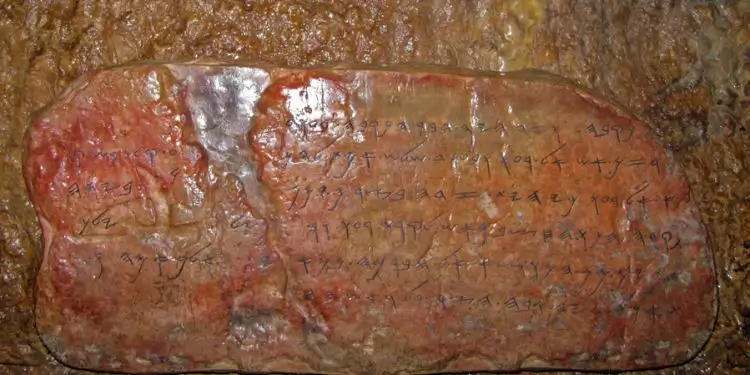The Siloam inscription describes how workers met when building a water tunnel from both ends simultaneously in King Hezekiah’s time.
By Batya Jerenberg, World Israel News
Turkey has agreed to return to Israel its most important ancient Hebrew inscription as a result of the recent warming of ties between the two countries, Times of Israel reported Friday.
Israel has wanted the Siloam Inscription back for years, as it proves a Biblical account of the building of a water tunnel in Jerusalem in King Hezekiah’s time, 2,700 years ago. As described in both the Books of Kings and Chronicles, afraid of a siege on the City of David by the Assyrians, the king ordered that a tunnel be dug from the Pool of Siloam outside the city walls in order to bring the water source into the capital.
Written in paleo-Hebrew on the wall of approximately the midpoint of the tunnel, the inscription describes how the excavators, working from both ends simultaneously, heard each other’s voices and cut through the last bit of rock between them so that the water could flow into Jerusalem.
The myriads of visitors who have walked through the tunnel at the City of David site just south of the Old City near the Western Wall have only seen a copy of the inscription set into its original place. The real stone has been displayed for years in the Istanbul Archaeology Museum as part of a collection of relics discovered during the 400-year reign of the Ottoman Empire over much of the Middle East, including what is now the modern State of Israel.
Officials from both sides worked out the details of the transfer during President Isaac Herzog’s state visit to Ankara last Wednesday, the first time an Israeli leader had come on an official visit since 2008.
Turkish President Recep Erdogan, who has been a vocal critic of Jerusalem for years, hosting top Hamas officials in his country involved in planning terror attacks in Israel, marked the occasion by saying, “This historic visit will be a turning point in relations between Turkey and Israel. Strengthening relations with the State of Israel has great value for our country.”
According to an Israeli official quoted in the report, in exchange for the inscription, Israel will give Turkey a religiously important item from its history, probably an ancient candelabra from the Ottoman period.
Former Prime Minister Benjamin Netanyahu said the Turks rejected a request he made some 14 years ago for a similar exchange of artifacts. In 2007, then-president Shimon Peres had asked that Ankara merely lend Israel the stone to be displayed as part of the country’s 70th anniversary festivities, but a downturn in relations over the Hamas coup in the Gaza Strip and Israel’s subsequent blockade nixed the plan.
The museum also has another ancient caption from Jerusalem, known as the Temple Warning Inscription. Etched on the balustrade of the Second Temple, the tablet cautions pagan visitors not to proceed any further towards the Jewish holy site, on penalty of death.
Palestinian Foreign Minister Advisor Ahmad a-Dikh claimed Sunday that the Turkish Ministry of Religious Services has denied in a written letter the Israeli reports claiming Turkey agreed to return the inscription, Telegram channel Abu Ali Express reported.
The channel also reported last week that opponents of Israel in the Arab world have been uncomfortable watching Israel’s “diplomatic blitz,” referring not only to Herzog’s visit to Ankara but also Lapid’s meeting with King Abdullah in Jordan and IDF Chief of Staff Aviv Kochavi’s visit to Bahrain.





